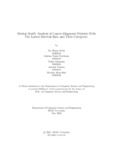| dc.contributor.advisor | Sadeq, Farig Yousuf | |
| dc.contributor.author | Orchi, Irin Hoque | |
| dc.contributor.author | Prarthona, Sabrina Tajrin | |
| dc.contributor.author | Tabassum, Nafisa | |
| dc.contributor.author | Hossain, Jaeemul | |
| dc.contributor.author | Ishti, Iftekhar Alam | |
| dc.date.accessioned | 2023-12-31T05:56:27Z | |
| dc.date.available | 2023-12-31T05:56:27Z | |
| dc.date.copyright | 2023 | |
| dc.date.issued | 2023-05 | |
| dc.identifier.other | ID 19301023 | |
| dc.identifier.other | ID 19101397 | |
| dc.identifier.other | ID 19101184 | |
| dc.identifier.other | ID 19101632 | |
| dc.identifier.other | ID 18201040 | |
| dc.identifier.uri | http://hdl.handle.net/10361/22043 | |
| dc.description | This thesis is submitted in partial fulfillment of the requirements for the degree of Bachelor of Science in Computer Science, 2023. | en_US |
| dc.description | Cataloged from PDF version of thesis. | |
| dc.description | Includes bibliographical references (pages 33-34). | |
| dc.description.abstract | Throughout the world, millions of people and their families are impacted by the
serious illness of cancer. The total number of new cancer cases worldwide in 2020
was predicted to reach 18.1 million. Serious emotional disorders, like depression,
are often present in cancer patients due to many factors, including the intensity of
certain situations, the negative consequences of their long treatment, or the deaths
of other cancer patients. Therefore, keeping an eye on the patient’s moods is crucial
to their ongoing treatment. Many cancer patients use online social media sites such
as Facebook and Twitter to communicate their thoughts and emotions about their
treatments, as well as the difficulties associated with them, in the form of posts
or messages. From these sources, we can get good information about the mood of
those patients, which will further help us with their treatment. After applying the
necessary pre-processing to this data, we can apply sentimental analysis methods,
which will help us predict the positive or negative emotions of cancer patients on
these online platforms. We can give better psychological support to these patients
after analyzing their mental health. So, our objective is to design a model capable
of identifying such actions, as among all the cancers we are working on, five have
the lowest survival percentage. | en_US |
| dc.description.statementofresponsibility | Irin Hoque Orchi | |
| dc.description.statementofresponsibility | Sabrina Tajrin Prarthona | |
| dc.description.statementofresponsibility | Nafisa Tabassum | |
| dc.description.statementofresponsibility | Jaeemul Hossain | |
| dc.description.statementofresponsibility | Iftekhar Alam Ishti | |
| dc.format.extent | 34 pages | |
| dc.language.iso | en | en_US |
| dc.publisher | Brac University | en_US |
| dc.rights | Brac University theses are protected by copyright. They may be viewed from this source for any purpose, but reproduction or distribution in any format is prohibited without written permission. | |
| dc.subject | Sentimental analysis | en_US |
| dc.subject | Psychological support | en_US |
| dc.subject | Cancer patient | en_US |
| dc.subject | SBERT | en_US |
| dc.subject | RNN | en_US |
| dc.subject | GRU | en_US |
| dc.subject | LSTM | en_US |
| dc.subject | Few shots | en_US |
| dc.subject | Emotional valence | en_US |
| dc.subject.lcsh | Machine learning | |
| dc.subject.lcsh | Natural language processing (Computer science) | |
| dc.subject.lcsh | Artificial intelligence | |
| dc.title | Mental health analysis of cancer-diagnosed patients with the lowest survival rate and their caregivers | en_US |
| dc.type | Thesis | en_US |
| dc.contributor.department | Department of Computer Science and Engineering, Brac University | |
| dc.description.degree | B.Sc. in Computer Science | |

